#pmp audit
Text
Cracking the PMP Application: Audits, Examples, and San Diego Training Options
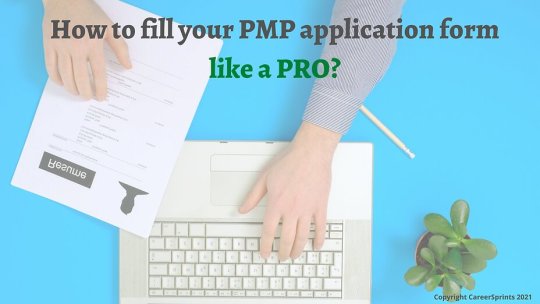
Holding a Project Management Professional (PMP) certification proves to employers that you are an expert with leadership traits which are vital in the project management profession. Even though getting this certified recognition is consequently crucial, things don't end just yet at passing the initial PM as it may happen that one undergoes an internal PMP application audit conducted by the authorities of Project Management Institute.
For more info, visit: https://medium.com/@careersprints/cracking-the-pmp-application-audits-examples-and-san-diego-training-options-8a5aebfc74ce
1 note
·
View note
Text
Navigating the PMP Renewal Audit: What to Expect and How to Prepare
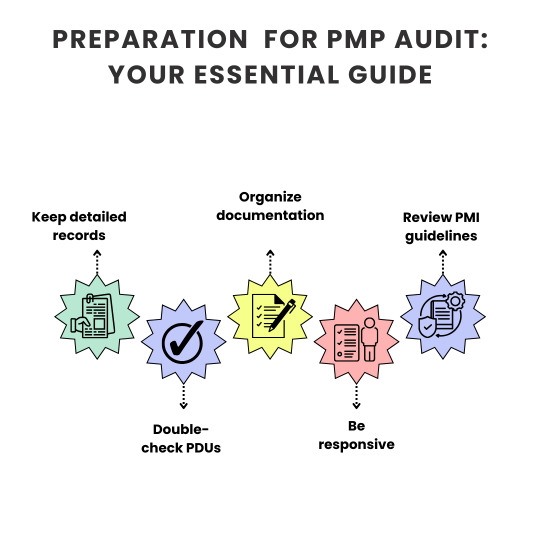
Explore expert strategies and insider tips to navigate PMP renewal audits seamlessly in this comprehensive guide. Learn how to prepare effectively, understand the audit process, and ensure success in maintaining your PMP certification. From understanding the renewal process to practical tips for documentation and responsiveness, this blog has you covered. Discover the keys to mastering PMP renewal audits and maintaining your professional edge with confidence.
0 notes
Text
Phone: (647) 642-4350
Address: 470 Duncan Ln, Milton, ON L9T 0V5
Email: [email protected]
CareerSprints is the premier destination for professional learning, specializing in PMP, Agile and Scrum, DevOps, ITIL, Kanban, Product Owner and Business Analysis training and certification. Founded by passionate and dedicated instructors, CareerSprints is committed to equipping individuals with the knowledge and skills needed to excel in their careers. CareerSprints' PMP Blended program has been instrumental in helping hundreds of students pass their PMP exam on the first try. Several students recommend our PMP Blended Programme because it includes a unique blend of personalized coaching, classroom training, and self-paced training. CareerSprints offers top-notch assistance in PMP application writing and approval, serving as the leading PMP application review and rewrite service online.
CareerSprints also offers certifications in Agile, Scrum, Kanban, Product Owner, DevOps, and Business Analysis, which have been taken by thousands of students worldwide.
CareerSprints has worked with various universities and private and public companies such as the University of California, the NHS in the UK, and Scheidt & Bachmann, providing high-quality training in diverse formats, from in-class to virtual sessions.
#PMP certification training#PMP application#PMP application examples#PMP Application Audit#FCAS certification#FCKB certification#BAF certification
1 note
·
View note
Text
Looking At the Stars like we used to
09:12
Seven years ago, February, Shuji and Kashimura
You’re so annoying, Kashimura!
Shuji scribbled on the piece of paper and expertly passed it to Kashimura, two desks diagonally in front. Kashimura glanced at the note and glared at Shuji—that bastard. Kashimura scrawled an angry sentence back.
I am NOT giving you the answer! You know how to solve that question anyway.
Kashimura scrunched up the note and threw it to Shuji. The paper flawlessly landed next to Shuji’s book.
Pft! Kashimura is so mean! I bet that’s why he’s still 150 cm tall!
LAY OF MY SIZE, YOU JACKASS! I’M FIFTEEN, I’M STILL GROWING!
Hobbit species. Replied Shuji simply.
What an ass. Kashimura was about to write something (in all capitals) when he was suddenly called out by the teacher, looking sternly at him.
“Kashimura, what answer did you get to question three?” Asked the teacher, clearly knowing he had been passing notes with Shuji. The blackboard was full of expressions and equations Kashimura hadn’t noticed. Fuck.
“Fourteen to the power of seven.” Grumbled Kashimura, saying the first thing that came to his mind. The class erupted in snickers— attempts of trying not to laugh, but failing. How very annoying.
“Nowhere close.” Said the teacher, unimpressed. “If you are going to pass notes in my class, you need to know how to do your maths first. Now, will Shuji give us the answer?” The teacher peered at Kashimura’s “accomplice”.
“Negative six, sir.” Chirped Shuji happily.
“Correct.” Said the teacher, but disappointed that he couldn’t tell Shuji off.
Kashimura glared as Shuji smiled, all cocky. Why did Shuji even ask what the answer was when he knew it all along?
***
“Hey, mackerel! It’s all your fault! Why did you even decide to pass me a note? It was a nice maths lesson too!” Kashimura continued to rant as Shuji poked his tongue out at him. It was 3:15, right after the final period of the day. Kashimura threw his satchel at Shuji’s head.
“Kashimura, you’re a psycho for liking Maths! And the teacher!” Shuji spoke lazily in his voice as if he didn’t even want to use his energy to talk with Kashimura.
“You son of a bitch.” Muttered Kashimura. Yes, he likes maths, mostly because he can irritate Shuji to entertain himself, but that always somehow gets reversed.
“Now, Kashimura, that’s not a nice thing to say!” Said Shuji, pouting his lips. He discreetly likes it when Kashimura swears, but it will be on his deathbed when he says it.
“Have I ever intended to be nice to you?” Said Kashumura icily, side-eyeing Shuji.
“Why are you talking to me then, chibi?” Teased Shuji, eyes wide with mockery.
“Stop. Calling. Me. A. Fucking. Chibi.” Growled Kashimura.
“I’m fourteen, I’m still growing~!” Mimicked Shuji sarcastically.
Kashimura didn’t speak, instead casting a glare. Whatever he says, Shuji always has a way of retorting.
“You going to that drama audition tomorrow? You know, the one Port Mafia is holding for six plays?” Asked Shuji, In an attempt to steer the conversation away. It was a bit stupid, considering the answer would be no.
Kashimura is a Sheep actor, and the Sheep hates the Port Mafia productions. The Port Mafia Theatre Department has lots of successful productions, eight out of ten of their plays were recorded and released online. and even if you never saw their plays, you would have watched Port Mafia Products on TV. But the PMP was also known for hiring underage actors and involving sketchy deals. That was probably why The Sheep hated them.
The Sheep was a small local company, consisting of little kids, it was almost like a drama workshop. Kashumura is a skilled actor, but Shuji personally thinks he is wasting talent in the Sheep. They usually do common plays in the town theatre, with storylines so dire they were funny. Chuuya was a Sheep actor, but still a tiny tot fifteen-year-old, so he had to go to school. Being in the Sheep made Chuuya quite popular at school, though.
“Yeah.” Said Kashimura, surprised. “How did you know?”
Full work on Ao3:
15 notes
·
View notes
Text
What Are The Latest Business Certifications In 2023?
Business certifications can help you advance your career and improve your skills in a variety of business areas by validating your skills in a specific domain. Certifications are necessary to address the current needs of the constantly increasing digital economy.
Let us go through a comprehensive list of the latest trending business certifications that can make you more marketable to employers.

Certified Supply Chain Professional (CSCP) Certification: You can verify your skills in supply chain management with this one of the credible certifications. It is a great way to show that you understand the different aspects of supply chain management and that you can apply those skills to improve the efficiency and effectiveness of your organization's supply chain.
Six Sigma Certification: Six Sigma certifications, such as Six Sigma Green Belt and Six Sigma Black Belt, validate one's ability to analyze and improve business processes to enhance efficiency and quality.
Certified Business Analysis Professional (CBAP) Certification: This certification targets professionals who want to validate their skills in business analysis. It verifies that the certified professionals have the core knowledge to define business requirements and translate those requirements into technical specifications.
Project Management Professional (PMP) Certification: It is one of the most well-known and respected project management certifications in the world. With this certification, you can boost your professional career by demonstrating your skills and knowledge in project management.
Certified Management Accountant (CMA) Certification: The CMA certification recognizes expertise in management accounting and financial management, making it relevant for professionals in financial planning, analysis, and control.
Google Cloud Certified - Professional Cloud Architect Certification: This certification is for professionals who want to demonstrate their skills in designing, building, and managing Google Cloud Platform (GCP) solutions. It is a great way to show that you are up-to-date on the latest GCP technologies and that you can use them to build scalable and secure cloud-based solutions.
Certified Information Systems Auditor (CISA) Certification: CISA is a globally recognized certification for information systems audit, control, and security professionals. It demonstrates competence in assessing and managing an organization's IT and business systems.
AWS Certified Solutions Architect - Associate Certification: This certification is for professionals who want to demonstrate their skills in designing, building, and deploying applications on Amazon Web Services (AWS). It is a great way to show that you are up-to-date on the latest AWS technologies and that you can use them to build scalable and secure cloud-based solutions.
Chartered Financial Analyst (CFA) Certification: The CFA designation is highly regarded in the finance and investment industry, signifying advanced skills in investment analysis, portfolio management, and ethical standards.
Certified ScrumMaster (CSM) Certification: CSM certification is designed for individuals who want to become Scrum Masters and facilitate agile project management and product development teams.
2 notes
·
View notes
Text
Don't Get Caught Slipping! A Guide to PMP Renewal and PDUs
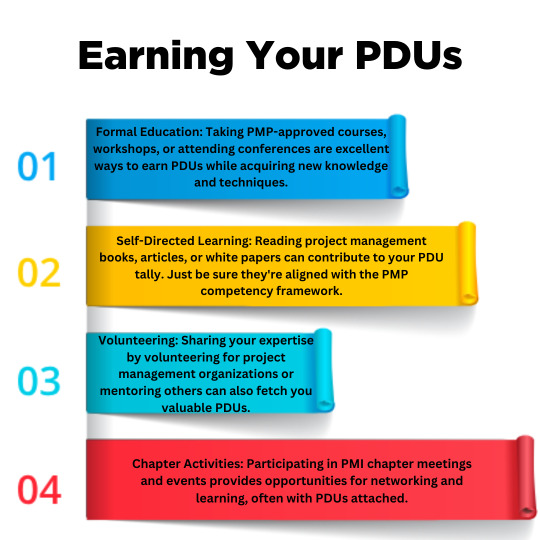
Introduction
Maintaining your Project Management Professional (PMP) certification shows that you are dedicated to continuing your education and remaining up to date in the industry. However, because project managers sometimes have hectic schedules, PMP renewal could catch you off guard. This blog post will act as your go-to resource for information about the PMP renewal procedure, with a particular emphasis on the crucial Professional Development Units (PDUs).
PDU Overview: Comprehending Your Needs
The PMP renewal currency is PDUs. In order to keep your certification current, you must accrue 60 PDUs in total during a three-year period. The time you spend developing your project management expertise is reflected in these units.
Obtaining Your PDUs: Various Paths for Advancement
The good news is that PMI provides multiple options for earning PDUs to accommodate various learning preferences and styles. Here are a few well-liked choices:
Formal Education: Attending conferences, workshops, and courses that are approved by PMP are great ways to learn new skills and earn PDUs.
Self-Directed Learning: You can accrue PDUs by reading books, articles, or white papers about project management. Just make sure the PMP competency framework is in line with them.
Volunteering: You can also earn important PDUs by lending your knowledge by mentoring others or volunteering for project management groups.
Chapter Activities: Attending PMI chapter meetings and events offers chances to learn and network, frequently in conjunction with Professional Development Units.
Recall to keep thorough records of all the PDUs you earn. For auditing purposes, PMI demands documentation, so keep track of completion reports, receipts, or certificates for every task.
Renewing with Self-Assuredness: A Simplified Procedure
Visit PMI's online CCR (Continuing Certification Requirements) portal to submit your renewal application after you've earned the necessary 60 PDUs. The procedure is simple, and PMI gives you detailed instructions to help you at every stage.
Keep Up with the Times: Proactive Strategies for Renewal
Don't run around looking for PDUs at the last minute. The following advice will help you remain ahead of the cycle of renewal:
Make a note of it: Set up calendar notifications to notify you when renewal deadlines are approaching.
Arrange your education: To prevent a last-minute rush, space out your PDU-earning activities throughout the course of the three-year cycle.
Accept lifelong learning: See PDU requirements as a chance to keep up with industry developments and develop your project management abilities.
You may retain your valued certification and guarantee a seamless PMP renewal procedure by adhering to these guidelines and exercising proactive management. Renewing your PMP makes you more marketable and in demand because it shows that you are committed to project management excellence.
0 notes
Text
Renew your PMP certification. PDU: A Guide to Continuous Professional Development
As a Project Management Professional (PMP), you are aware of how crucial it is to stay up to date in the ever-evolving field of project management. Every three years, PMPs must renew their certification with the Project Management Institute (PMI) by completing a process that requires them to accrue Professional Development Units (PDUs). We'll dive into the world of using PDUs to renew your PMP certification in this blog post, as well as examine some of the most important features of pmp renewal pdu.
Comprehending PDU Fundamentals
The foundation of your career advancement as a PMP are PDUs. These are professional and educational endeavors that support the upkeep, improvement, and growth of your knowledge and abilities. To make sure that PMPs are always learning and adjusting to the changing needs of the industry, PMI uses the PDU system.
PDU classifications
You must accrue a certain amount of PDUs across several categories in order to renew your PMP certification. Two primary categories are defined by the PMI:
PDUs for education:
Technical: Specializing in skills related to project, program, or portfolio management.
Leadership: centered on developing abilities in group dynamics, compromise, and resolving disputes.
Strategic: Concentrated on business and strategic management.
Returning PDUs:
Creating Knowledge: This includes writing papers, giving talks at conferences, and creating material.
Volunteering: Giving back to the project management community by volunteering your time and expertise.
Obtaining PMP PDUs
Let's now look at several strategies for obtaining those important PDUs and maintaining the validity of your PMP certification:
Attend training sessions and workshops:
To earn PDUs in Technical, Leadership, and Strategic areas, take part in workshops, seminars, or training programs that are pertinent to you.
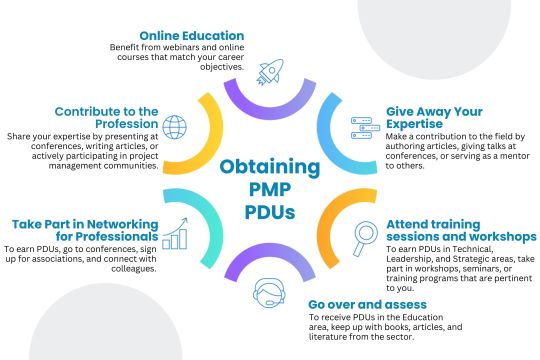
Online Education:
Benefit from webinars and online courses that match your career objectives.
Go over and assess:
To receive PDUs in the Education area, keep up with books, articles, and literature from the sector.
Take Part in Networking for Professionals:
To earn PDUs, go to conferences, sign up for associations, and connect with colleagues.
Give Away Your Expertise:
Make a contribution to the field by authoring articles, giving talks at conferences, or serving as a mentor to others.
Process of PMP PDU Renewal
Please report your earned PDUs by logging into the PMI Continuing Certification Requirements (CCR) portal when your certification renewal date draws near. Don't forget to keep records of your actions in case of an audit.
In summary
Not only is it necessary to renew your PMP certification through PDUs, but it also presents a chance for ongoing professional development. Accept the variety of PDU earning options available to you and customize your professional development to fit your career objectives. You'll be able to remain active in the project management community and pursue lifelong learning, which will help you both as a project management professional and in keeping your PMP certification.
Never forget that continuing to be proactive in your professional development is essential for a successful PMP certification renewal. Take the time to educate yourself, impart knowledge, and support the project management community. The regeneration process is more satisfying the more involved you are.
So go ahead and renew pmp certification pdu and start your road toward continuous project management excellence. Your dedication to lifelong learning will help you personally as well as the progress of the project management industry as a whole.
0 notes
Text
How to get a PMP certification? Steps to make it a success!
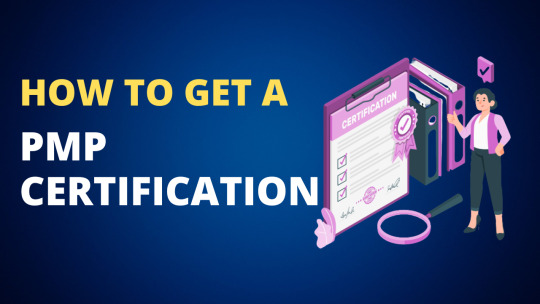
Obtaining the Project Management Professional (PMP) certification is a significant milestone in the career of any aspiring project manager. This globally recognized certification not only enhances your professional credibility but also opens up new opportunities in the field of project management. To help you embark on this journey, we have prepared a comprehensive guide that outlines the key steps to successfully obtain your PMP certification. In the following 1000 words, we will walk you through How to get a PMP certification, from eligibility requirements to exam preparation strategies.
1. Understanding the PMP Certification
The PMP certification is awarded by the Project Management Institute (PMI) and is one of the most respected credentials in the field of project management. It signifies that the certified individual possesses the knowledge and skills required to excel in project management roles. To embark on this journey, it's essential to understand the core components of the PMP certification:
1.1 Eligibility Requirements
Before you can even think about taking the PMP exam, you must meet certain eligibility requirements:
- A four-year degree (bachelor's or the global equivalent) and at least three years of project management experience, with 4,500 hours leading and directing projects, and 35 hours of project management education.
OR
- A high school diploma or an associate’s degree (or the global equivalent) and at least five years of project management experience, with 7,500 hours leading and directing projects, and 35 hours of project management education.
1.2 The PMP Exam
The PMP exam is a rigorous assessment that evaluates your knowledge and skills in project management. It consists of 200 multiple-choice questions covering various aspects of project management, and you have four hours to complete it. The questions are based on the Project Management Body of Knowledge (PMBOK), which is a foundational resource for project management professionals.
2. The Roadmap to PMP Certification
To successfully obtain your PMP certification, you need to follow a systematic roadmap. Let's break down the key steps:
2.1 Eligibility Assessment
Before applying for the PMP exam, you should assess your eligibility. Ensure that you meet the educational and professional experience requirements outlined by PMI. If you meet the criteria, proceed to the next step.
2.2 PMI Membership
While not mandatory, becoming a member of PMI can be beneficial. It provides access to valuable resources, networking opportunities, and a discount on the PMP exam fee. If you decide to become a member, sign up on the PMI website.
2.3 PMP Application
Once you are certain of your eligibility, you can begin the PMP application process. PMI has an online portal where you can submit your application. It will require you to input your project management experience, education, and other relevant details. Be thorough and accurate in your application.
2.4 Application Review
After submitting your application, PMI will review it to ensure it meets the eligibility requirements. This process can take up to five business days. If your application is selected for an audit, you will need to provide documentation to validate the information you provided. Be prepared to provide proof of your education and project management experience.
2.5 Payment of Exam Fee
Once your application is approved, you will receive an email with instructions on how to pay the PMP exam fee. The fee varies for PMI members and non-members. Make the payment within the specified timeframe to secure your exam appointment.
2.6 Scheduling the Exam
After payment, PMI will send you an authorization to test (ATT) email. This email will contain instructions on how to schedule your exam through Pearson VUE, PMI's testing partner. You can choose a test center near you or opt for an online proctored exam.
3. Exam Preparation
With your exam scheduled, it's time to prepare. The PMP exam is known for its difficulty, so effective preparation is crucial. Here are some steps to help you succeed:
3.1 Study Resources
PMI provides various study resources, including the PMBOK Guide and the PMP Exam Content Outline. These are essential references for the exam. Additionally, there are numerous PMP exam preparation books, online courses, and practice exams available to help you prepare.
3.2 Create a Study Plan
Develop a study plan that outlines your study schedule, topics to cover, and milestones. This will help you stay organized and track your progress.
3.3 Join a PMP Prep Course
Consider enrolling in a PMP exam preparation course. These courses are designed to comprehensively cover the exam material and often provide valuable study materials and resources.
3.4 Practice, Practice, Practice
Practice exams are your best friend in the PMP exam preparation process. They help you become familiar with the exam format and identify areas where you need improvement. PMI offers a PMP practice exam, and there are various commercial options available.
3.5 Study Groups
Joining or forming a PMP study group can be highly effective. Group discussions, peer support, and the opportunity to explain concepts to others can enhance your understanding of the material.
4. Taking the Exam
The day of the exam can be nerve-wracking, but with proper preparation, you can approach it with confidence. Here are some tips for taking the PMP exam:
4.1 Relax and Rest
Ensure you get a good night's sleep before the exam. Arrive at the test center or log in for the online proctored exam well in advance to avoid any last-minute stress.
4.2 Manage Your Time
The PMP exam has 200 questions to be completed in four hours. You should aim to spend approximately 1.2 minutes per question. If you encounter a challenging question, flag it and move on, coming back to it later if necessary.
4.3 Read Carefully
Carefully read each question and all answer choices. Often, the key to answering correctly lies in understanding what the question is asking.
4.4 Stay Calm
Maintain composure during the exam. Don't panic if you encounter challenging questions. Trust your preparation and stay focused.
4.5 Review Your Answers
If time allows, review your answers. It's common to catch mistakes or misinterpretations during the review process.
5. After the Exam
Once you've completed the PMP exam, the waiting game begins. PMI will evaluate your results, and if you pass, you will receive your PMP certification. If you don't pass on your first attempt, don't be discouraged; many individuals take the exam more than once before succeeding.
5.1 Continuing Education
After obtaining your PMP certification, you must earn Professional Development Units (PDUs) to maintain your certification. PDUs can be acquired through various activities such as attending seminars, webinars, or taking additional courses.
Conclusion
Earning your PMP certification is a significant achievement that can boost your project management career. By following the steps outlined in this guide, from understanding the eligibility requirements to effective exam preparation and beyond, you can successfully attain this valuable credential. Remember that the journey to becoming a PMP requires dedication, but the rewards, both professionally and personally, are well worth the effort. So, start your PMP journey today, learn how to get a PMP certification, and set yourself on a path to a brighter future in project management.
0 notes
Text
Roadmap for Successful PMP® Certification Journey
Are you ready to embark on a journey towards obtaining your PMP® (Project Management Professional) certification? Congratulations! This certification can significantly enhance your career prospects and validate your expertise in project management. To help you navigate this exciting but challenging path, we've prepared a comprehensive roadmap that will guide you through the entire PMP® certification process.
Understanding PMP® Certification
What is PMP® Certification?
PMP® certification is a globally recognized credential offered by the Project Management Institute (PMI) that signifies your proficiency in project management principles and practices.
Why Pursue PMP® Certification?
Learn why PMP® certification is worth pursuing and how it can boost your career.
Prerequisites and Eligibility
Prerequisites for PMP® Exam
Discover the prerequisites you need to meet before applying for the PMP® exam.
Eligibility Criteria
Understand the specific eligibility criteria set by PMI for PMP® candidates.
Application Process
Filling Out the Application
Step-by-step guidance on completing your PMP® application accurately.
Audit Process
Learn about the potential audit process and how to prepare for it.
Exam Preparation
Study Resources
Explore a variety of study resources, including books, courses, and practice exams.
Creating a Study Plan
Tips for creating a personalized study plan that suits your schedule and learning style.
Exam Content and Format
Understanding the Exam
Get insights into the structure and format of the PMP® exam.
Exam Domains
Learn about the five domains covered in the PMP® exam and their importance.
Tips for Exam Day
Exam-Day Strategies
Discover valuable tips for managing stress and maximizing your performance on exam day.
Post-Exam Activities
After the Exam
What to expect after completing your PMP® exam and how to track your results.
Continuing Education
Understand the Continuing Certification Requirements (CCR) program and how to maintain your certification.
Benefits of PMP® Certification
Career Advancement
Learn how PMP® certification can open doors to new career opportunities.
Increased Earning Potential
Explore the financial benefits associated with being a PMP® certified professional.
Conclusion
Obtaining your PMP® certification is a significant achievement that can lead to exciting career prospects. By following this roadmap, you'll be well-prepared to tackle the PMP® certification journey with confidence.
0 notes
Text
Project Management Professional A Roadmap to Success
In today’s dynamic and competitive business environment, effective project management is crucial for organizations aiming to achieve their goals and deliver successful projects. As companies continue to recognize the value of skilled project managers, the demand for certified Project Management Professionals (PMPs) is on the rise. If you’re considering a career in project management or want to enhance your existing skills, this article will serve as a roadmap to guide you towards becoming a PMP and achieving success in the field.
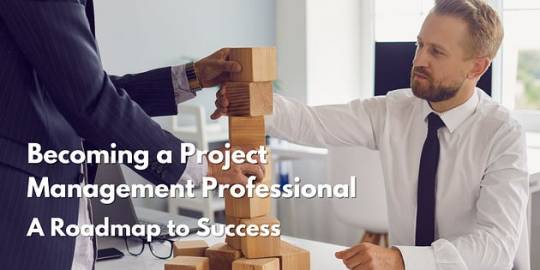
Understanding the PMP Certification
The Project Management Professional (PMP) certification, offered by the Project Management Institute (PMI), is one of the most globally recognized and respected credentials in the field of project management. Attaining this certification signifies your commitment to the profession and your ability to lead projects effectively.
Prerequisites for PMP Certification
Before embarking on the journey to becoming a PMP, it’s essential to meet the prerequisites set by PMI:
Educational Background: You must have a secondary degree (high school diploma, associate’s degree, or equivalent) and at least five years of project management experience, with 7,500 hours leading and directing projects, or a four-year degree and at least three years of project management experience, with 4,500 hours leading and directing projects.
Project Management Education: You also need to complete 35 hours of project management education, which can be fulfilled through training programs, courses, or workshops.
The PMP Exam
Once you meet the prerequisites, the next step is to prepare for and pass the PMP exam. The exam is a rigorous test of your project management knowledge and skills, covering a wide range of topics such as project initiation, planning, execution, monitoring and controlling, and closing.
To prepare effectively:
Study the PMBOK Guide: The Project Management Body of Knowledge (PMBOK) Guide is a comprehensive resource for PMP exam preparation. It provides an in-depth understanding of project management processes, tools, and techniques.
Take PMP Exam Prep Courses: Consider enrolling in PMP exam prep courses or workshops. Many reputable organizations and online platforms offer structured training programs to help you prepare.
Practice with Mock Exams: Solve practice questions and take mock exams to familiarize yourself with the format and types of questions you’ll encounter during the actual exam.
Application Process
Before scheduling your exam, you’ll need to submit your PMP application through the PMI website. This application requires you to document your project management experience and education. PMI may audit applications, so be prepared to provide verification for the information you submit.
Exam Day
On the day of the exam, arrive early, well-prepared, and confident. The PMP exam consists of 200 multiple-choice questions, and you’ll have four hours to complete it. Focus on understanding the questions, applying your knowledge, and managing your time effectively.
Maintaining Your PMP Certification
Once you pass the PMP exam, you’ll join the ranks of certified Project Management Professionals. However, it’s important to note that PMP certification requires ongoing professional development. You must earn and report 60 Professional Development Units (PDUs) every three years to maintain your certification.
Benefits of PMP Certification
Obtaining your PMP certification offers numerous advantages:
Enhanced Career Opportunities: PMPs are highly sought after by employers, opening doors to a wide range of career opportunities in various industries.
Increased Earning Potential: PMP certification often leads to higher earning potential due to the specialized skills and expertise it signifies.
Global Recognition: PMP is recognized and respected worldwide, making it a valuable asset for professionals seeking international opportunities.
Improved Project Success: With your advanced knowledge and skills, you’ll be better equipped to lead projects to successful completion, earning the trust of your team and stakeholders.
Networking Opportunities: Becoming a PMP allows you to connect with a global community of project management professionals, facilitating knowledge sharing and career growth.
Conclusion
Becoming a Project Management Professional is a challenging yet rewarding journey that can significantly boost your career prospects and project management skills. By following the roadmap outlined in this article, you can navigate the process successfully and position yourself as a trusted leader in the field of project management. Your PMP certification will not only benefit your professional growth but also contribute to the success of the projects you manage and the organizations you serve.
0 notes
Text
Understanding the PMP Configuration Management System
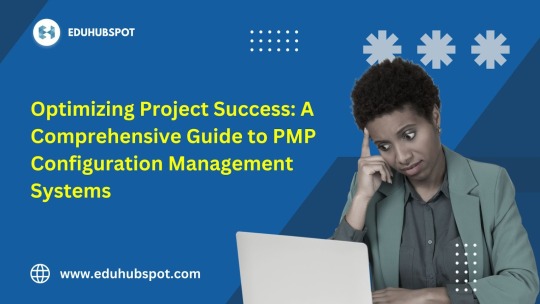
With the increasing complexity of projects and the crucial need to control various elements involved, the PMP Configuration Management System has gained significant traction. This article delves deep into understanding this system, and its benefits.
What is the PMP Configuration Management System?
PMP Configuration Management System (CMS) is a collection of procedures used to track project artefacts and monitor changes to these artefacts. In essence, it provides a structured approach for managing how changes are introduced into a project, ensuring that all changes are recorded, assessed, approved, and tracked.
The Core Components of PMP Configuration Management
Configuration Identification: This is the process of labelling and documenting the characteristics of project artefacts. It's about understanding what you have and detailing it.
Configuration Status Accounting:
This component focuses on documenting the status and changes of project artefacts. It involves recording and reporting the current status of all project artefacts and any requested changes.
Configuration Control:
This process focuses on evaluating, coordinating, approving, or disapproving changes to project artefacts. It ensures that no unnecessary changes occur without proper evaluation and approval.
Configuration Auditing:
This involves verifying and ensuring that the configurations of project artefacts are compliant with their requirements and that changes have been implemented correctly.
Benefits of the PMP Configuration Management System
Enhanced Control Over Project Artefacts:
The system ensures that you have complete control over all artefacts, ensuring no unintended changes can slip through.
Documented Changes:
All changes are documented, making it easier to trace back and understand any changes made during the project lifecycle.
Improved Stakeholder Communication:
With a structured system in place, stakeholders are always in the loop about any proposed changes, ensuring transparency.
PMP Certification Exam Benefits
Acquiring the PMP certification not only validates one’s proficiency and understanding of project management practices but also confers several other advantages:
Global Recognition:
PMP is a globally recognised certification, showcasing your expertise to potential employers worldwide.
Higher Salary Potential:
On average, PMP certified professionals earn more than their non-certified counterparts.
Better Job Opportunities:
Many employers prefer, if not demand, PMP certification for their project management roles.
Knowledge Enhancement:
The rigorous training and examination process ensures that you're well-versed in modern project management techniques and practices.
Conclusion
The PMP Configuration Management System is an indispensable tool in the world of project management. It not only ensures the smooth operation of projects but also keeps all stakeholders informed. While the PMP certification can elevate your career prospects, platforms like EduHubSpot ensure that the journey to obtaining it is much more straightforward.
FAQs
1. What is the primary purpose of the PMP Configuration Management System?
The main aim is to manage changes systematically, ensuring that all modifications to project artefacts are recorded, evaluated, approved, and tracked.
2. How does PMP certification benefit professionals?
It offers global recognition, potential for a higher salary, better job opportunities, and a deep understanding of modern project management practices.
3. How can EduHubSpot support my PMP journey?
EduHubSpot offers expert-led training, a wealth of study materials, and continuous support to ensure you're well-prepared for both the PMP exam and the application of the Configuration Management System.
4. Is the PMP Configuration Management System limited to IT projects?
No, while it's prevalent in IT projects, the system is applicable across various sectors wherever project artefacts need to be tracked and managed.
0 notes
Text
Navigating the PMP® Exam Application Process: Your Gateway to Certification
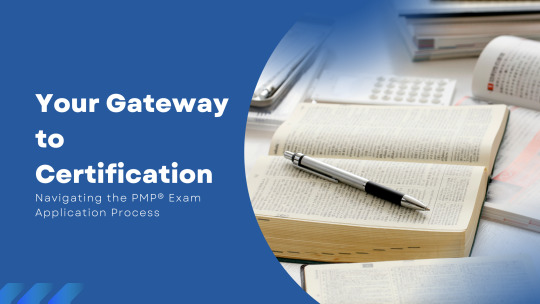
The path to becoming a certified Project Management Professional (PMP)® involves a well-defined application process set by the Project Management Institute (PMI)®. This process ensures that candidates meet the eligibility criteria and are ready to take on the challenging PMP® exam. Here’s a comprehensive guide to help you navigate the PMP® exam application process:
**1. Eligibility Check: Before diving into the application, ensure you meet the eligibility requirements based on your education and work experience. You need either a secondary degree (with five years of project management experience) or a bachelor’s degree (with three years of experience) along with 35 hours of project management education, or you can join a PMI authorized PMP Exam Preparation course.
**2. Create a PMI® Account: Visit the PMI® website and create an account. This account will serve as your gateway to the application process, exam scheduling, and accessing study materials.
**3. Start the Application: Once logged in, initiate the PMP® exam application. This process requires inputting details about your education, project management experience, and contact information.
**4. Experience Documentation: For each project you’ve managed, provide information about the project’s title, the organization, your role, and the number of hours spent in each of the five project management process groups (initiation, planning, execution, monitoring and controlling, and closing). You’ll also need to describe your key responsibilities.
**5. Education Documentation: If you’re using a bachelor’s degree to meet the eligibility criteria, you’ll need to provide details about your education, including the name of the institution, the degree earned, and the completion date.
**6. PM Education Documentation: If you’ve completed a formal project management education course or joined a PMI authorized PMP Exam Preparation course, you’ll need to provide information about the course, the institution, the date of completion, and the number of hours of instruction.
**7. Application Review: Review your application carefully to ensure accuracy and completeness. Once submitted, you cannot make changes without contacting PMI®.
**8. Application Payment: Upon completing the application, you’ll be prompted to pay the examination fee. PMI® offers different fee structures for PMI® members and non-members.
**9. Application Audit (If Applicable): PMI® conducts random audits to verify the information provided in your application. If selected for an audit, you’ll need to submit documentation, such as project descriptions, proof of education, and course certificates.
**10. Approval and Examination Scheduling: Once your application is approved (either immediately or after a successful audit), you’ll receive an eligibility ID. You can use this ID to schedule your PMP® exam at a Prometric test center or for online proctoring.
**11. PMP® Exam Preparation: While waiting for your exam date, engage in comprehensive exam preparation, including studying the PMBOK® Guide, using study materials, and taking practice exams.
**12. PMP® Exam Day: Arrive at the test center (or set up your online proctoring environment) on the scheduled exam day. Be prepared to tackle the 180 multiple-choice questions within the allotted time.
**13. Passing the Exam: Upon successfully passing the PMP® exam, you’ll receive your certification, which is valid for three years.
**14. Maintaining Certification: To maintain your PMP® certification, you must earn Professional Development Units (PDUs) through continuing education and participate in the PMI® Continuing Certification Requirements (CCR) program.
Remember that the PMP® application process is a critical step in your journey toward certification. Ensuring that your application is complete, accurate, and well-documented is key to a smooth and successful experience. With diligent preparation and adherence to the process, you’ll be well on your way to becoming a certified Project Management Professional.
0 notes
Text
511: The Difference Between A Construction Accountant And A Tax Accountant
This Podcast Is Episode Number 511, And It's About The Difference Between A Construction Accountant And A Tax Accountant
How often have you hired someone with the expectation that they know how construction works, and then you found out they did not know about it? You are a master in the construction industry, so you recognize what to look for in your particular field and quickly observe if someone has the skillsets, and you proceed accordingly.
You know what happens when you send your best Rough Carpenter that you pay piece work for framing spec from the ground up in all kinds of weather and working conditions to install some custom-made cherry wood cabinets with gold plated pulls and knobs in the home of your best client (who happens to be in the wealthiest neighborhood in your town). It is not a pretty sight.
Have you pictured a crew with muddy work gear and boots stepping onto your client's pristine floors? The dirty secret is that Tax Accountants operate like Rough Carpenters because they work fast and furious, and they are paid piece work. The main difference is that they earn the bulk of their annual income in three and a half months. This means they do not waste time going through your receipts to ensure you get all the deductions you are entitled to.
Both Groups Are Important, And Each One Fills A Need
Project Management Construction Accounting Professionals (PMP) work above the line and focus on generating positive outcomes and results for contractors:
Increase Sales
Reduces Expenses
Increase Net Income
Certified Public Accountants (CPA) work below the line focused on filling out annual income tax forms, ensuring contractors pay their fair share of taxes, preparing certified financial statements, and performing audits on your QuickBooks contractor file.
Three Times Construction Contractors Need A CPA In Their QuickBooks For Contractors File:
You apply for a large loan or line of credit over a million dollars
You need certified financial statements to get a performance bond
Your construction company is so large that you are required to have an annual audit
Most construction contractors with annual sales under $10,000,000 and less than 20 employees will never have those issues.
Preparing end-of-year reports and filing taxes can be complicated. If you're not doing it right, you could be liable for penalties or, at the very least, not take advantage of tax gains and financial opportunities. A Construction Accountant can ensure your business remains compliant (and pay as little tax as possible), help you analyze your business performance, and work with you to achieve your goals.
On the other hand, Tax Accountants can kill more cash flow and profit in your construction business (in less than an hour) by preparing your annual tax return using a messed up QuickBooks file than you can make up for with hard work in several months, if not years. This is because saving you money on your tax bill is not what they are paid to do; they are paid to fill out tax returns.
Why does it need to be separate?
Trust but verify! When you need financing, most bankers and finance sources like to see a separation of duties. They want to see two different firms involved because it reduces the chance of errors, collusion, cover-up, and fraud. They may not say a word to you; however, we often hear about it!
We insist our construction contractor clients use an outside CPA or tax preparer to review the QuickBooks Contractor's bookkeeping services that we have performed and prepare the annual income tax return. As a result, we have developed good working relationships with several CPA firms and yearly qualified tax preparers.
It is good to know our contractor clients trust us and know that we have their best interest in our minds and hearts; however, we are human, make mistakes, and welcome input from CPAs and tax preparers. It is all about teamwork and people working together to ensure everything in your construction accounting system works correctly.
Bottomline: Construction Accountants should not be preparing annual tax returns because nobody can serve two masters. Either be a Tax Accountant and serve the interests of the tax collection agencies or be a Construction Accountant and serve the interests of contractors.
Please don't think we are too hard on Tax Accountants. Understand that we have great relationships with them. We have had Tax Accountants review our QuickBooks and prepare our business and personal returns for over thirty years, and we refer many businesses to various Tax Accounting and Preparation companies.
What you need to look for is someone who is experienced, capable, and understanding. You should feel they'll be a good advisor and are interested in developing a long-term professional relationship with you.
Having the right Construction Accountant for your business leaves you free to focus on why you started the construction company in the first place – to see it grow and become profitable. A Construction Accountant and a Tax Accountant are integral to this because they'll keep your finances on track. Which, in the end, is the whole point.
About The Author:

Sharie DeHart, QPA, is the co-founder of Business Consulting And Accounting in Lynnwood, Washington. She is the leading expert in managing outsourced construction bookkeeping and accounting services companies and cash management accounting for small construction companies across the USA. She encourages Contractors and Construction Company Owners to stay current on their tax obligations and offers insights on managing the remaining cash flow to operate and grow their construction company sales and profits so they can put more money in the bank. Call 1-800-361-1770 or [email protected]
Check out this episode about Contractors Marketing - Accounting - Production (M.A.P.)!
0 notes
Text
Accessibility Penetration Testing is the SHIFT + LAW disruptor the Tech World needs.
If you said Accessibility was the hottest thing to hit the tech field in years- you would be half right. The false assumption that a11y is a tenet of Computer Science is the misconception that has prevented companies from seeing the bigger picture, wasting accessibility resources due to fundamental misunderstanding of what it is and what it isn’t. Accessibility is a not a native technical skill wielded by the tech world- it is a legal skill, first and foremost, a derivative of the widestanding Civil Rights movement of the mid 20th Century, adopted by the tech world in the early 21st Century.
This chief misunderstanding blindfolds good executives from understanding how to manage an Accessibility Program, often deploying specialists solely to educate + audit artists and programmers (specifics of which are not the point of this article) and figuring that is all there is to be done. Leadership then trusts conventional policy, bureaucrats, and PMP Theory to somehow “protect” finance, legal, and PR. But Policy, particularly enacted by those without deep experience of the nebulous world of the ADA and the WCAGs, doesn’t substantially protect an organization from risk in this area- it only insulates from gaining much needed experience in the trenches to understand precisely how Accessibility failures enable risk. Additionally, a policy-rich approach to Accessibility wastes budgets AND chokes devs and SME’s in unnecessary red tape of management creation- the antithesis of Agile development. Instead, of coating an Accessibility Program with heavy policy on how to deal with defects and resolutions at every single step of the process, it is essential to stay more lean. Instead of thinking like a bureacrat, leadership would be much better off adopting additional tactics to start thinking like a lawyer- and then taking that a step further and thinking like your enemies.
Accessibility Penetration Testing is a term I coined today, a process best described as a reindeer games-esque wargame carried out by an SME and attorney to “attack” their own company. This new Best Practice is the single most effective method to educate executives, reveal the true risk in the courtroom and public opinion. This exposes, and trains, how your legal department will respond, how PR handles outrage on mock “Fwitter”, and the shakedown reveals other weakness such as lack of live-case experienced staff.
At the end of the day it doesn’t matter how many consultations you provided to your developers- the only thing that matters in the end is the opposing force that intends to damage and disrupt your company, which is entirely out of your control. Like dealing with terror and crime, the plaintiff will always have the luxury of first strike and get to choose how and where the attack will come from- which is why security risk management principles can be so much better suited for accessibility than conventional Agile solutions are. Which makes sense given that Accessibility was never founded in any computer system- it arose from the law system.
Living in a legal state of mind, not just an Agile one, is key. For example, just to poke a sacred cow, consider that good documentation, a principle of software development, can actually CREATE unnecessary smoking guns susceptible to discovery by plaintiff. Additionally, think about the manner in which fundamental misunderstandings have trickled all the way down into every single a11y process now- even down to terminology and policy controls; an “ADA Defect” is not a technical concept, and should not be used in any test document or Agile process because it miseducates. An “ADA Defect” is something that can only be determined in a court of law, not a policy meeting. WCAG’s aren’t even recognized legal precedent in our country- “Defects” are ONLY determined by a judge/jury after a murky process based on the totality of objective, subjective, procedural and spiritual merit.
In conclusion, while early involvement is here to stay as the SHIFT + LEFT process the accessibility world deserves- simulated experience managing a realistic scenario is the SHIFT + LAW process we actually need. Moving forward, executives would do well to heartily embrace Accessibility Penetration Testing as a new cornerstone of their threat solution- in addition to stop over-relying on I.T. risk management policies designed for software that don’t apply to legal situations.
0 notes
Text
Hey Stop Project Failure With Our Project Management Training Course!
This course provides the 35 hours of project management education required to write down the exam. The Project Management Academy for the previous three years has catered for most learning interventions regarding project management. It has been our experience that the PMA has glorious facilitators with an intensive understanding of project management principle mixed with practical project management expertise.
If the paperwork demanded by the audit procedure are not submitted then it will take longer. Candidates are offered a duration of 90 days to submit the documents requested for. The earlier one submits, lesser would be the time taken for the application’s approval. Disciplined studying for three hours frequently during 3 consecutive months is the best preparation time. Working professionals might regulate the schedule as per their work timings however there isn’t a shortcut.
The fundamentals course is aimed at members who require a basic background in project management and concept. It will allow profitable participants to manage a project in government, enterprise or an NGO setting. It also serves as entrance into the course in Specialised Project Management.
This space of the course examines the skills and knowledge required to regulate a project and covers; the principles of management systems, the use of Earned Value Analysis and change management techniques. Project Close A look at the method of closing a project and the necessary thing deliverables produced. We purpose to offer programs that serve the need of the present market and virtually upskill the workforce to ship higher projects.
A day-to-day job in project management fetches a certain number of PDUs. The concept is to examine if the licensed skilled is able to using his skills properly. A PMP Certification in Welkom opens the door to several job profiles within the subject of project management. Project managers, sponsors, coordinators, and staff members can take a leap in their careers through this accreditation. Aspirants can apply for PMP examination only after fulfilling the 35 contact hours of formal project management schooling.
He subsequently accomplished an MBA at the University of Pretoria in 2000 and has accomplished his research for a PhD within the field of ICT project management profession path improvement. He presently acts as external examiner and guest lecturer for the MIT programme on the University of Pretoria and acts as an educational supervisor for faculty kids at Da Vinci’s Master’s Degree programme. Dr Krüger has held various lecturing positions and has taught within the fields of human resource management, project management, monetary management, logistics management, economics and manufacturing management.
0 notes
Text
Keeping Your Skills Sharp: Earning PMP Renewal PDUs
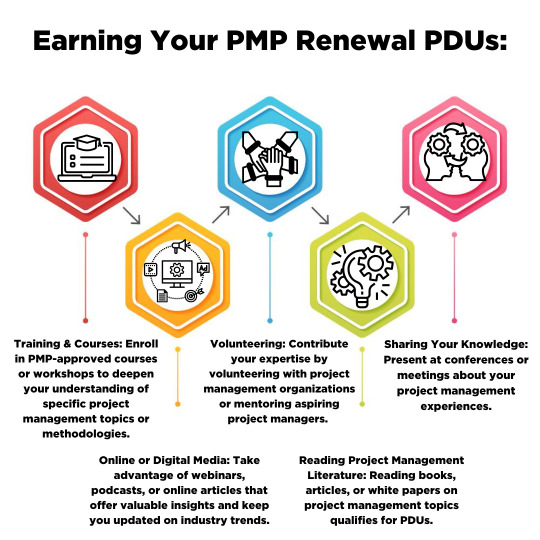
Introduction
Keeping up with the latest developments in the always changing world of project management is demonstrated by maintaining your Project Management Professional (PMP) certification. A crucial aspect of this procedure is meeting the PMP PDU prerequisite. However, what are PDUs precisely, and how can one obtain them?
Definition of PDU:
The acronym PDU denotes a Professional Development Unit. To keep your certification, PMP requires you to acquire 60 PDUs every three years. The time and effort you put into developing your project management expertise is reflected in these PDUs.
Obtaining PDUs for PMP Renewal:
The flexibility that the PMP renewal PDU system provides is what makes it so lovely. You can customize your learning to fit your interests and schedule by choosing from a variety of methods to complete the requirement. Here are a few well-liked choices:
Training & Courses: To enhance your comprehension of particular project management topics or approaches, sign up for workshops or courses that have been approved by PMP.
Webinars, podcasts, and online publications are excellent resources for gaining important insights and staying up to date on industry trends.
Volunteering: Offer your skills by serving as a mentor to aspiring project managers or by volunteering with project management groups. This is a fantastic opportunity to earn PDUs and give back.
Reading Project Management Literature: PDUs can be earned by reading books, articles, or white papers about various aspects of project management.
Giving Away Your Expertise: Talk about your experiences with project management at conferences or gatherings.
Conclusion
For the purpose of a PMI audit, keep track of all of your PDU-earning activities.
Plan your PDU acquisition over the course of the three-year cycle to prevent rushing at the last minute.
Concentrate on tasks that will not only satisfy the criteria but also improve your understanding and abilities in project management.
You can make sure your PMP certification stays active and your project management skills remain sharp by carefully implementing PMP PDU earning into your professional development plan.
0 notes